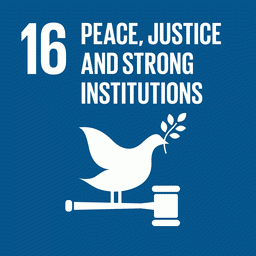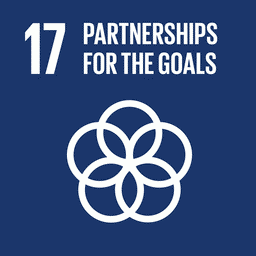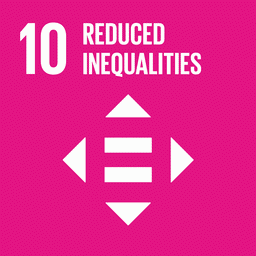A quick survey of Alter do Chão, a region in the municipality of Santarém (PA), shows a paradise destination for tourists, known as the Amazonian Caribbean. But, what for some is a peaceful retreat, for Paulo Galvão, is the battlefield for the preservation of the lands and traditions of his people and other local communities.
Galvão was born in Alter do Chão and belongs to the Borari indigenous people. He saw that region undergo many transformations. He is 18 years old, a volunteer at Engajamundo, coordinator of the organization’s inclusion program, and a national articulator of GT Clima. He is also part of a local cell at Tapajós, Enagajajós, which works with indigenous people, Quilombolas, people that live along rivers, and every one who lives in the area. He currently lives in Franca, São Paulo, where he studies International Relations at Unesp.
The team of Amazoniar, an initiative of IPAM (Amazon Environmental Research Institute) to promote a global dialog about Amazon, talked with Galvão about his work as an activist, how the struggle of the traditional people inspired him to choose such a path at such a young age, what changes he saw his land undergo, the role of culture as a resistance tool, why the region must be preserved, and how it can be developed for its own people and everyone else.
What are you most proud of having done for the Amazon?
I am most proud of the collective work, the strength of this group that is trying to protect our territory and is always ready to fight for it, articulating and giving information. I remember what we did in Alter do Chão in 2019, when it was touched by bush fires. We traveled to the burned region, a very large area in the Amazon savannah, and it was very sad. We managed to map great losses and took some action by taking some photos: we put up several signs with the names of animals that used to live there and a big sign with the words “Save the Amazon.” That was one of the moments that touched me the most, because it was at the very beginning of our collective work.
What was the greatest lesion you have learned in these years working with the socio-environmental agenda?
Looking back two, three months, or years ago, I can see how much we have done. I, my group, the people around us, we have all evolved and managed to accomplish many things. We found out that we cannot stop. We have to do the most for what we believe in. I believe that everyone should defend our territory. However, this life is not for everyone. This work have taught me that we really need to defend our place. We must have a goal and do our best to achieve it. People may say it is impossible. However, what I am most proud of in this journey is that we are doing our best to achieve what we want. I can always learn by talking to other people and seeing things from other perspectives and realities. This prepares us for the world and for the work of activism. We learned a lot with this connection, by not being alone, in a bubble. We understand that we live in a giant community, and that there are different ways of living.
What do you think of what is happening in the Amazon?
We have been seeing the destruction of the Amazon for a long time. But, in recent years and months, we are seeing that the media has been giving much more attention to it. People are paying more attention to Amazon, talking and researching more about the issue. We really need to make it become an agenda in Brazil, because many Brazilians do not know what the Amazon is, while people from other countries understand better how important it if for Brazil and for the world and how the region should be managed. Many Brazilians never visited the Amazon. They do not know how people there live. Nowadays, the mass destruction reported in the news are drawing attention, especially from large companies, usually with the pretext of protection. Especially in recent years, we are seeing companies that actually want to explore the Amazon or are financing the exploration and activities that are definitely destroying the forest. The voice of activism is still very low. We cannot submit all our demands to the big centers and decision-making environments. Nevertheless, we have more access to those environments and, somehow, we are managing to report what is happening in the territory.
You belong to an indigenous people that is taking its land back. Could you explain what it means and why the nations should guarantee the indigenous rights?
The indigenous peoples as a whole underwent a process of extermination from which we will never be able to recover or measure, especially in Brazil. In the Amazon region, it was not different. The extermination of the people who lived there was huge, and we lost our language, other peoples, their culture… we lost contact with many things we probably never going to know. I was watching a leadership video about re-adopting the culture of our ancestors—smoking, bathing, everything that was sacred to them and still is for us. At some point, though, we stopped doing those things the way the used to do. For us, “recovery period” means going back to our roots, understanding where we came from, drawing a map, and understanding our territory, our culture, and our language. This term is new for us. The leaders are encouraging we to use it, especially the youth, to taking our people back. And not only our people, but our country as a whole, because Brazil is indigenous land. We need to talk about it and re-adopt the culture we had 500 years ago, which was exterminated. I really like talking about the tacking-back issue, because it helps us understand what is our perspective of the society, of our relationship with the land, our guides, and ancestors. In this process, I can find out who were the people that came before me, what were their struggles and for what I need to fight. It is also very important to talk about taking our territory back and demarcate it. Alter do Chão and several other territories on the Lower Tapajós, for example, are not demarcated, and we are struggling to do it.
The region of Alter do Chão is famous for its natural attractions and known worldwide as the Amazonian Caribbean. For you, who was born there, what were the main changes you have seen in recent years, both in the environmental and social spheres?
The term Amazonian Caribbean puts Alter do Chão under the spotlight. This territory is extensively explored due to its natural attractions. Nevertheless, that is not its only source of exploration. The environment and its people are also explored, because they are taken away from their lands so big enterprises are able to build there, closer to the riverside. Alter do Chão was very small. It had two or three streets, and they were all inhabited by the local population. Nowadays, on the main street, along the seafront, we see huge houses, buildings, hotels… companies that took people away from their homes. Only two houses belonging to native families survived. In 2019, next to these houses, there was a huge land with trees and a lot of vegetation. It was all destroyed to make an open field. So, a lot of dust started to get into those houses and it was very hot. When we talk about those places that are under the spotlight, like those at the waterfront, the companies will do everything to kick its dwellers out of there. It will happen directly or indirectly. You need a lot of endurance to stay.
In the last 10, 15 years, tourism increased a lot in Alter do Chão. It is mainly focused on exploring the region’s natural attractions. We also have more conscious, sustainable touristic initiatives that invites people to find out what the community is all about. The tourists learn about the Borari people’s territory, an indigenous territory, which is nowadays called “village.” That is a very delicate process, because we understand that the land is ours and we need to be there to demarcate our territory. However, some people think that it must be explored for its natural attractions and dominated by tourism. It is maddening to see things that are on paper and should not happen happening, such as the construction of buildings: the construction of a seven- or eight-store building is being concluded next to the protection area, which is prohibited pursuant to the Master Plan. But they got an injunction and are there. That is something that really puts natural attractions on the back burner; we got to see only buildings.
In the last few months, the case about changing the color of the water that flows to Alter do Chão reached the national and world news. Mining activities have been performed there for a long time, and the media never talked about it as it does now. Reporters had to get there discreetly to try to pinpoint the culprits. We know who is responsible not only for polluting the river but also for destroying the people in that region: mining, deforestation, land grabbing, and all the agribusiness present there. We live in a region of many conflicts, just like Santarém. We got deforestation, soy plantations, drainage, water exploiting, mining, plans to build a hydroelectric plant… We are facing many problems and trying to find a solution.
With all of this, we also see the vulnerability of the people taken away from their homes. They do not have access to education and other services because they live further away. In the pandemic, we managed to distribute some basic food baskets. We distributed 5,000 masks to the indigenous women’s group. We managed to get to places in Alter do Chão that people do not know, even those who have lived there for a long time, because those who are taken away from their homes have to live very far from the city center, and, if they can afford it, have to walk a lot to buy food. There is great inequality, because those who live in the center live well, but you do not have to walk a lot to see the inequality. People need a place with good economy, that could support them. However, it supports only a few, only the big companies. The region grew a lot, but the social development index has worsened.
Why did you choose to study International Relations? In your opinion, how important is it to involve the world in the climate and social discussions about the Amazon? How do you think other nations can contribute to the sustainability and development of the Amazon region?
I wanted to do International Relations because an Amazonian. Often, those who talk about the Amazon, either in Brazil or otherwise, do not have the background or experience to do it. They do not have the actual experience of someone who lived in the Amazon and do not know what actually happens there. Living there gives you an entirely different perspective. I chose to take this course to bring the Amazon people’s voice, especially the youth, out of there.
Regarding how other nations can contribute, what we usually watch in the news is that a certain fund is giving billions of dollars to the Brazilian government to preserve the Amazon rainforest. Some initiatives are better and others worse. It is very important to dialogue with other nations. When the fires took place in 2019, the president of France said, “The Amazon rainforest is a world heritage site and must be preserved.” This speech implies that the great nations that rule the world want to take over the Amazon and manage it in their own way. The other nations and people that are part of the Amazon rainforest, in addition to Brazil, must dialogue, so we can actually discuss what would be best for us and for the world as a whole. What do we have to do? How do we come together to fight? Not only for the Amazon, but also for the climate, for a socio-environmental agenda, and for the well-being of humanity.
Your father was part of a carimbó band in Alter do Chão. In your opinion, what is the role of music in activism?
Pará and the Amazon have several genres. Carimbó is the union of three cultures: indigenous, African, and Spanish. It has the drum of black culture and combines indigenous and Spanish dances. Pará has the popular culture of carimbó and other music genres characteristic of given areas. In Alter do Chão, we have marambiré and macaxeira, for example. Speaking of which, the western Pará has a carimbó movement with five masters, and my father is one of them. He left Santarém in 2011 and moved to the Southeastern region, bringing carimbó and a bit of our Amazon culture and history with him. He always says that, in his lyrics, in his workshops, and in everything he does, he wants to share the experience of someone who lived in Amazon, so people may hear and support our territory, regardless of their land of origin. We must have everyone’s support. Therefore, we use it as an instrument of social transformation, involving the whole community. When I was very young, my father would go to a square in Santarém, at the seafront, to teach percussion. I was always there, watching him. These places were used to build our culture as a space for activism—through the written word, through the speeches of artists and other masters. Chico Malta, the local carimbó movement coordinator, is the oldest master and is a knowledge machine. We can transform ourselves by listening these people talk. We start thinking more about what is happening around us.
What would you like to say to the next rulers of Brazil?
We need to have a system that can represent us, a system committed to people’s lives. If we do not have representatives in the office, the rulers will look after their own interests and do politics for themselves. Sometimes, when we see what is going on, it is hard to believe these people cannot think about how some of their decisions will affect them and their families. We need to understand that we live together and that we need to look after the well-being of everyone. We need politicians who are committed to people’s lives, dignity, and rights. Our Constitution is beautiful and it needs to be obeyed and respected. That is what I want to say to the next rulers of Brazil, regardless of their position: they must respect the right of the indigenous people to life, to walk on the street, to breathe fresh air, to have a land, and to bathe in clean rivers. I hope all parties dialogue, so we may live in a world of harmony.
About Amazoniar
Amazoniar is an initiative of IPAM (Amazon Environmental Research Institute) to promote a global dialogue about Amazon and its importance for Brazil’s relationships with the world. In its fourth cycle, Amazoniar will promote a series of interviews with young Brazilians and foreigners who inspire the mobilization for climate justice, especially in Amazon. In May and June, these interviews will be published every week, in full, on the IPAM website. Sign up for the newsletter to receive the next interviews!


